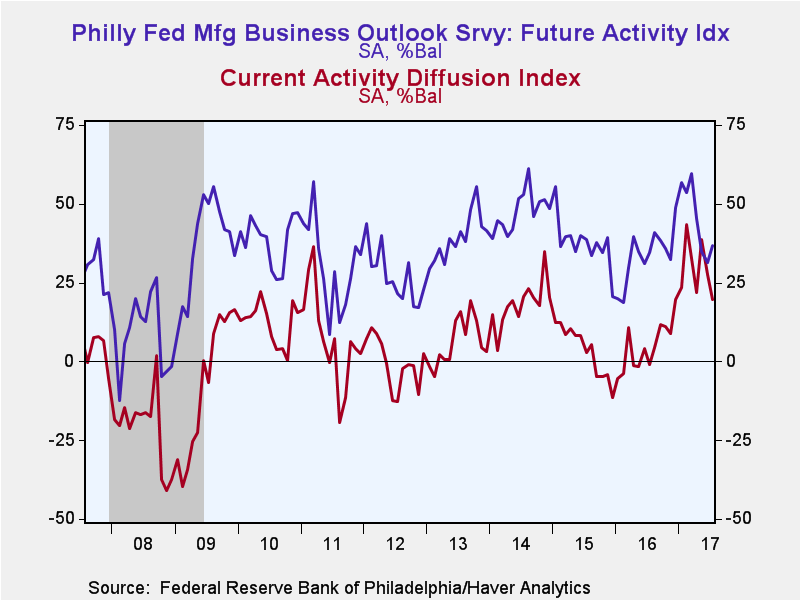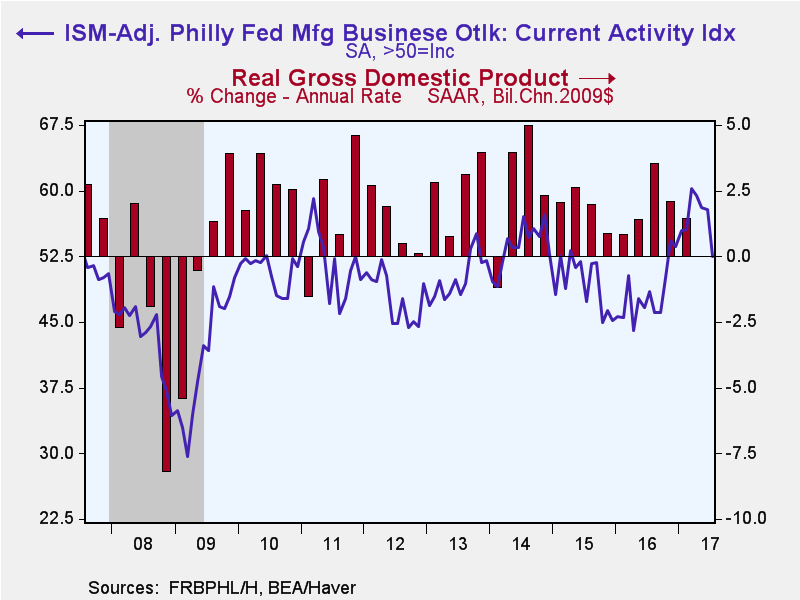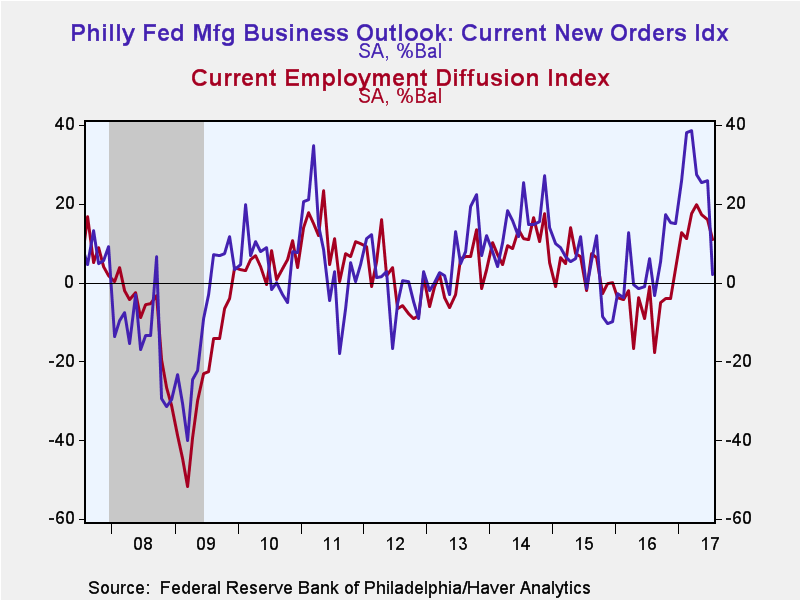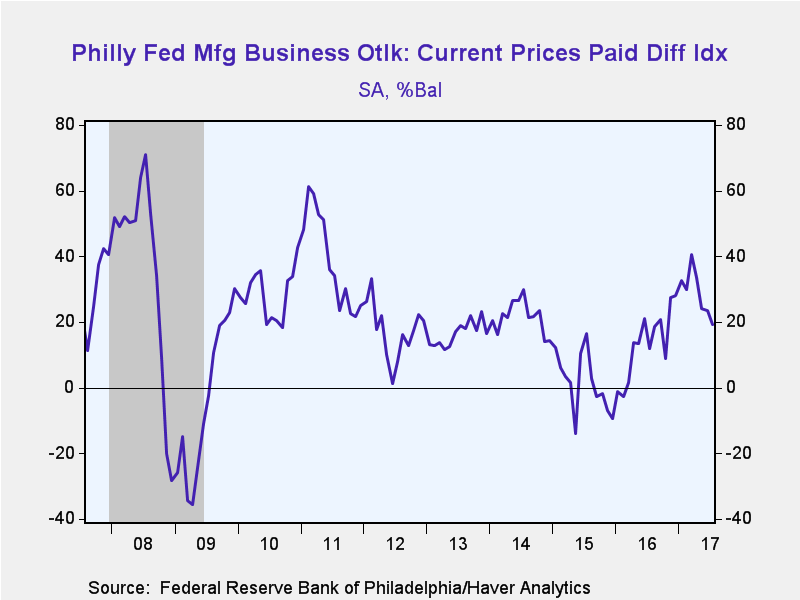 Global| Jul 20 2017
Global| Jul 20 2017Philadelphia Fed Factory Conditions Index Declines Further
by:Tom Moeller
|in:Economy in Brief
Summary
The Philadelphia Federal Reserve reported that its General Factory Sector Business Conditions Index fell to 19.5 during July and added to its June decline to 27.6. It was the lowest reading since November. The figure compared to [...]
The Philadelphia Federal Reserve reported that its General Factory Sector Business Conditions Index fell to 19.5 during July and added to its June decline to 27.6. It was the lowest reading since November. The figure compared to expectations for 22.5 in the Action Economics Forecast Survey.
The ISM-Adjusted General Business Conditions Index constructed by Haver Analytics fell to 52.5 this month, its lowest level in nine months. This figure is comparable to the ISM Composite Index. During the last ten years, there has been a 71% correlation between the adjusted Philadelphia Fed Index and real GDP growth.
The decline in the overall index reflected broad-based weakness in the component series. New orders were barely positive and shipments declined to the lowest point since September 2016. Unfilled orders, inventories and the delivery time index each weakened.
The employment series fell to the lowest level since December. During the last ten years, there has been an 81% correlation between the jobs index and the m/m change in manufacturing sector payrolls. The average workweek reading declined sharply to the weakest reading since November.
Prices paid declined to a nine-month low. Twenty-four percent of respondents (NSA) reported paying higher prices, while five percent paid less. The prices received index also fell sharply to the lowest level this year.
The future business activity index improved moderately from its nine-month low. Most of the sub-series increased m/m with the exceptions of shipments and employment.
The survey panel consists of 150 manufacturing companies in Federal Reserve District III (consisting of southeastern PA, southern NJ and Delaware). The diffusion indexes represent the percentage of respondents indicating an increase minus the percentage indicating a decrease in activity. The ISM-adjusted figure, calculated by Haver Analytics, is the average of five diffusion indexes: New orders, production, employment, supplier deliveries and inventories with equal weights (20% each). Each diffusion index is the sum of the percent responding "higher" and one-half of the percent responding "same."
The figures from the Philadelphia Federal Reserve can be found in Haver's SURVEYS database. The Action Economics figure is available in AS1REPNA.
| Philadelphia Fed - Manufacturing Business Outlook Survey (%, SA) | Jul | Jun | May | Jul'16 | 2016 | 2015 | 2014 |
|---|---|---|---|---|---|---|---|
| General Factory Sector Business Conditions | 19.5 | 27.6 | 38.8 | -0.9 | 4.8 | 3.6 | 18.3 |
| ISM-Adjusted Business Conditions | 52.5 | 57.9 | 58.1 | 48.5 | 48.2 | 49.4 | 53.7 |
| New Orders | 2.1 | 25.9 | 25.4 | 6.1 | 4.9 | 3.0 | 14.9 |
| Shipments | 12.2 | 28.5 | 39.1 | 2.3 | 6.9 | 3.1 | 16.3 |
| Unfilled Orders | 7.2 | 14.0 | 9.0 | 0.2 | -5.5 | -5.1 | 3.3 |
| Delivery Time | 7.4 | 13.9 | 6.4 | 1.0 | -4.6 | -4.1 | 0.6 |
| Inventories | 0.7 | 5.8 | 1.4 | -7.1 | -0.7 | -1.5 | 1.7 |
| Number of Employees | 10.9 | 16.1 | 17.3 | -1.0 | -5.7 | 3.9 | 10.5 |
| Prices Paid | 19.1 | 23.6 | 24.2 | 11.9 | 13.5 | 1.5 | 21.6 |
Tom Moeller
AuthorMore in Author Profile »Prior to joining Haver Analytics in 2000, Mr. Moeller worked as the Economist at Chancellor Capital Management from 1985 to 1999. There, he developed comprehensive economic forecasts and interpreted economic data for equity and fixed income portfolio managers. Also at Chancellor, Mr. Moeller worked as an equity analyst and was responsible for researching and rating companies in the economically sensitive automobile and housing industries for investment in Chancellor’s equity portfolio. Prior to joining Chancellor, Mr. Moeller was an Economist at Citibank from 1979 to 1984. He also analyzed pricing behavior in the metals industry for the Council on Wage and Price Stability in Washington, D.C. In 1999, Mr. Moeller received the award for most accurate forecast from the Forecasters' Club of New York. From 1990 to 1992 he was President of the New York Association for Business Economists. Mr. Moeller earned an M.B.A. in Finance from Fordham University, where he graduated in 1987. He holds a Bachelor of Arts in Economics from George Washington University.
More Economy in Brief
 Global| Feb 05 2026
Global| Feb 05 2026Charts of the Week: Balanced Policy, Resilient Data and AI Narratives
by:Andrew Cates










